Shareholder Oppression and Remedies: Grumpy Grande Company Case Study
VerifiedAdded on 2022/11/17
|5
|1536
|294
Case Study
AI Summary
This case study analyzes a scenario involving shareholder oppression within the Grumpy Grande Company, a family business. The core issue revolves around the actions of four brothers who, as majority shareholders, are accused of oppressing their younger brother, Tim, a minority shareholder. The brothers sold company assets to themselves without Tim's consent and prevented him from selling his shares, effectively attempting to exclude him from the business without financial benefit. The analysis explores the legal implications of this conduct, focusing on equitable limitations of voting powers and statutory protections under the Corporations Act. The study examines relevant case law, including Gambotto v WCP Ltd and Scottish Cooperative Wholesale Society Ltd v Meyer, to determine if the brothers' actions constitute oppression. The assignment considers potential remedies Tim can pursue, such as seeking court orders for the sale of his shares, the winding up of the company, or preventing the asset sale. The study concludes that the brothers' actions were unfair and prejudicial to Tim's interests, offering insights into how minority shareholders can seek legal recourse in cases of oppression.
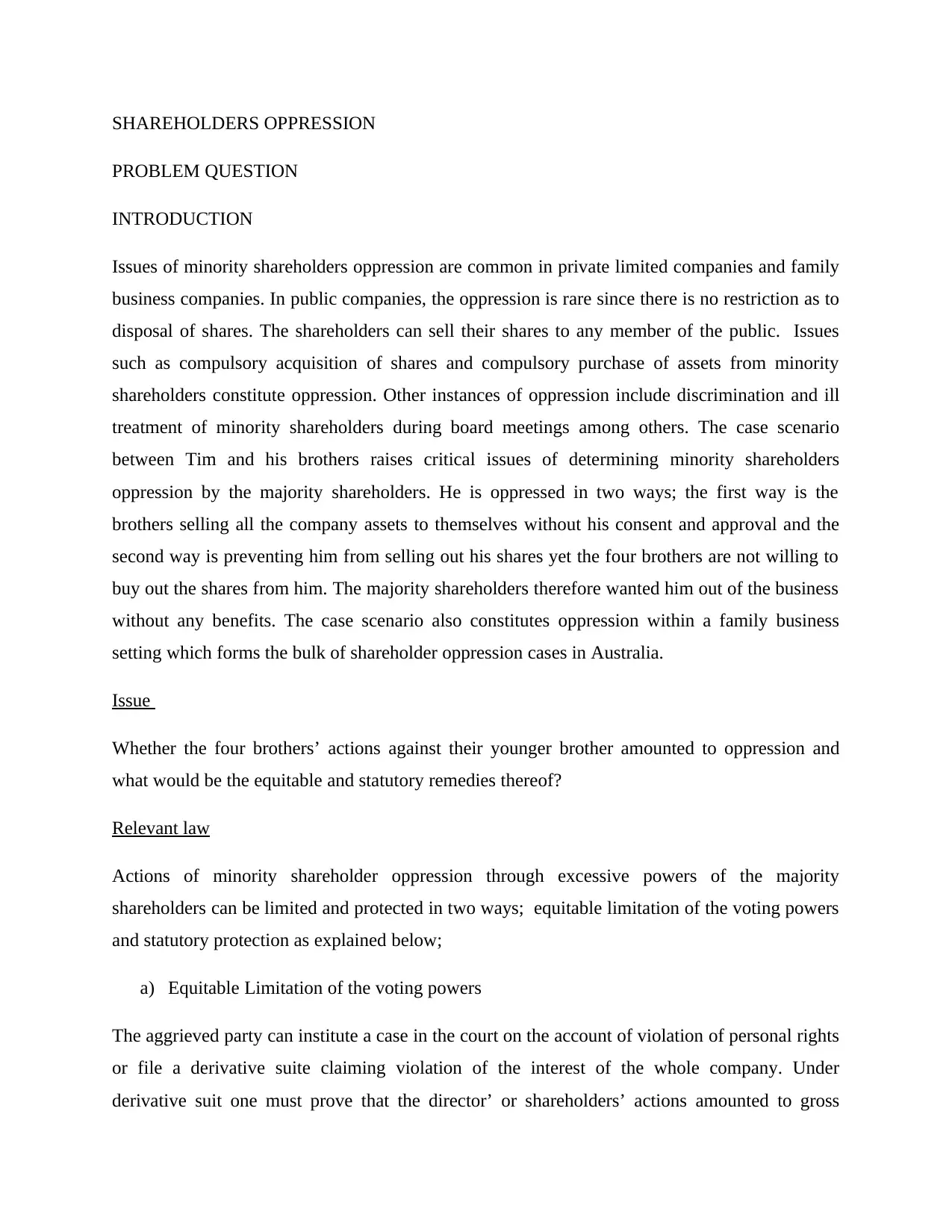
SHAREHOLDERS OPPRESSION
PROBLEM QUESTION
INTRODUCTION
Issues of minority shareholders oppression are common in private limited companies and family
business companies. In public companies, the oppression is rare since there is no restriction as to
disposal of shares. The shareholders can sell their shares to any member of the public. Issues
such as compulsory acquisition of shares and compulsory purchase of assets from minority
shareholders constitute oppression. Other instances of oppression include discrimination and ill
treatment of minority shareholders during board meetings among others. The case scenario
between Tim and his brothers raises critical issues of determining minority shareholders
oppression by the majority shareholders. He is oppressed in two ways; the first way is the
brothers selling all the company assets to themselves without his consent and approval and the
second way is preventing him from selling out his shares yet the four brothers are not willing to
buy out the shares from him. The majority shareholders therefore wanted him out of the business
without any benefits. The case scenario also constitutes oppression within a family business
setting which forms the bulk of shareholder oppression cases in Australia.
Issue
Whether the four brothers’ actions against their younger brother amounted to oppression and
what would be the equitable and statutory remedies thereof?
Relevant law
Actions of minority shareholder oppression through excessive powers of the majority
shareholders can be limited and protected in two ways; equitable limitation of the voting powers
and statutory protection as explained below;
a) Equitable Limitation of the voting powers
The aggrieved party can institute a case in the court on the account of violation of personal rights
or file a derivative suite claiming violation of the interest of the whole company. Under
derivative suit one must prove that the director’ or shareholders’ actions amounted to gross
PROBLEM QUESTION
INTRODUCTION
Issues of minority shareholders oppression are common in private limited companies and family
business companies. In public companies, the oppression is rare since there is no restriction as to
disposal of shares. The shareholders can sell their shares to any member of the public. Issues
such as compulsory acquisition of shares and compulsory purchase of assets from minority
shareholders constitute oppression. Other instances of oppression include discrimination and ill
treatment of minority shareholders during board meetings among others. The case scenario
between Tim and his brothers raises critical issues of determining minority shareholders
oppression by the majority shareholders. He is oppressed in two ways; the first way is the
brothers selling all the company assets to themselves without his consent and approval and the
second way is preventing him from selling out his shares yet the four brothers are not willing to
buy out the shares from him. The majority shareholders therefore wanted him out of the business
without any benefits. The case scenario also constitutes oppression within a family business
setting which forms the bulk of shareholder oppression cases in Australia.
Issue
Whether the four brothers’ actions against their younger brother amounted to oppression and
what would be the equitable and statutory remedies thereof?
Relevant law
Actions of minority shareholder oppression through excessive powers of the majority
shareholders can be limited and protected in two ways; equitable limitation of the voting powers
and statutory protection as explained below;
a) Equitable Limitation of the voting powers
The aggrieved party can institute a case in the court on the account of violation of personal rights
or file a derivative suite claiming violation of the interest of the whole company. Under
derivative suit one must prove that the director’ or shareholders’ actions amounted to gross
Paraphrase This Document
Need a fresh take? Get an instant paraphrase of this document with our AI Paraphraser
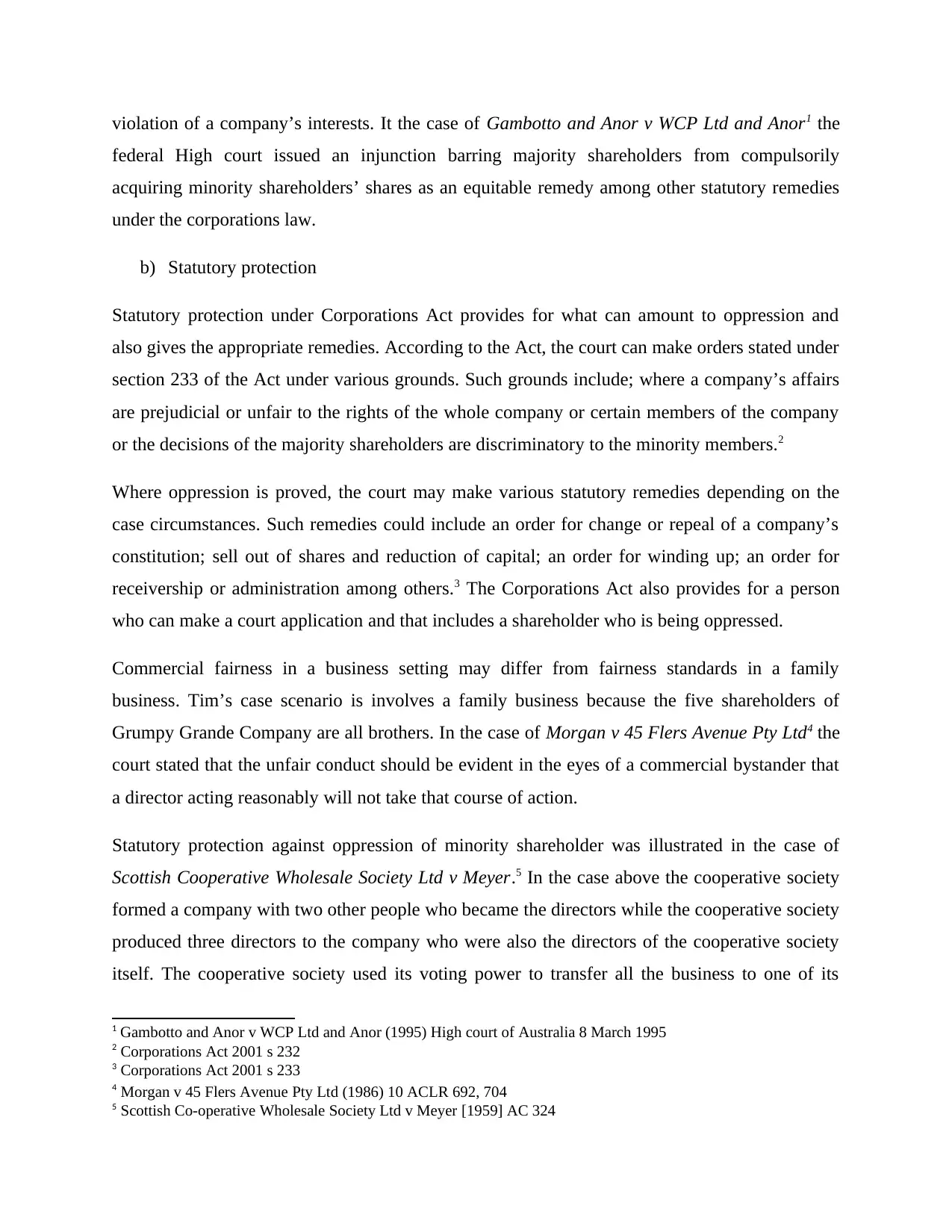
violation of a company’s interests. It the case of Gambotto and Anor v WCP Ltd and Anor1 the
federal High court issued an injunction barring majority shareholders from compulsorily
acquiring minority shareholders’ shares as an equitable remedy among other statutory remedies
under the corporations law.
b) Statutory protection
Statutory protection under Corporations Act provides for what can amount to oppression and
also gives the appropriate remedies. According to the Act, the court can make orders stated under
section 233 of the Act under various grounds. Such grounds include; where a company’s affairs
are prejudicial or unfair to the rights of the whole company or certain members of the company
or the decisions of the majority shareholders are discriminatory to the minority members.2
Where oppression is proved, the court may make various statutory remedies depending on the
case circumstances. Such remedies could include an order for change or repeal of a company’s
constitution; sell out of shares and reduction of capital; an order for winding up; an order for
receivership or administration among others.3 The Corporations Act also provides for a person
who can make a court application and that includes a shareholder who is being oppressed.
Commercial fairness in a business setting may differ from fairness standards in a family
business. Tim’s case scenario is involves a family business because the five shareholders of
Grumpy Grande Company are all brothers. In the case of Morgan v 45 Flers Avenue Pty Ltd4 the
court stated that the unfair conduct should be evident in the eyes of a commercial bystander that
a director acting reasonably will not take that course of action.
Statutory protection against oppression of minority shareholder was illustrated in the case of
Scottish Cooperative Wholesale Society Ltd v Meyer.5 In the case above the cooperative society
formed a company with two other people who became the directors while the cooperative society
produced three directors to the company who were also the directors of the cooperative society
itself. The cooperative society used its voting power to transfer all the business to one of its
1 Gambotto and Anor v WCP Ltd and Anor (1995) High court of Australia 8 March 1995
2 Corporations Act 2001 s 232
3 Corporations Act 2001 s 233
4 Morgan v 45 Flers Avenue Pty Ltd (1986) 10 ACLR 692, 704
5 Scottish Co-operative Wholesale Society Ltd v Meyer [1959] AC 324
federal High court issued an injunction barring majority shareholders from compulsorily
acquiring minority shareholders’ shares as an equitable remedy among other statutory remedies
under the corporations law.
b) Statutory protection
Statutory protection under Corporations Act provides for what can amount to oppression and
also gives the appropriate remedies. According to the Act, the court can make orders stated under
section 233 of the Act under various grounds. Such grounds include; where a company’s affairs
are prejudicial or unfair to the rights of the whole company or certain members of the company
or the decisions of the majority shareholders are discriminatory to the minority members.2
Where oppression is proved, the court may make various statutory remedies depending on the
case circumstances. Such remedies could include an order for change or repeal of a company’s
constitution; sell out of shares and reduction of capital; an order for winding up; an order for
receivership or administration among others.3 The Corporations Act also provides for a person
who can make a court application and that includes a shareholder who is being oppressed.
Commercial fairness in a business setting may differ from fairness standards in a family
business. Tim’s case scenario is involves a family business because the five shareholders of
Grumpy Grande Company are all brothers. In the case of Morgan v 45 Flers Avenue Pty Ltd4 the
court stated that the unfair conduct should be evident in the eyes of a commercial bystander that
a director acting reasonably will not take that course of action.
Statutory protection against oppression of minority shareholder was illustrated in the case of
Scottish Cooperative Wholesale Society Ltd v Meyer.5 In the case above the cooperative society
formed a company with two other people who became the directors while the cooperative society
produced three directors to the company who were also the directors of the cooperative society
itself. The cooperative society used its voting power to transfer all the business to one of its
1 Gambotto and Anor v WCP Ltd and Anor (1995) High court of Australia 8 March 1995
2 Corporations Act 2001 s 232
3 Corporations Act 2001 s 233
4 Morgan v 45 Flers Avenue Pty Ltd (1986) 10 ACLR 692, 704
5 Scottish Co-operative Wholesale Society Ltd v Meyer [1959] AC 324
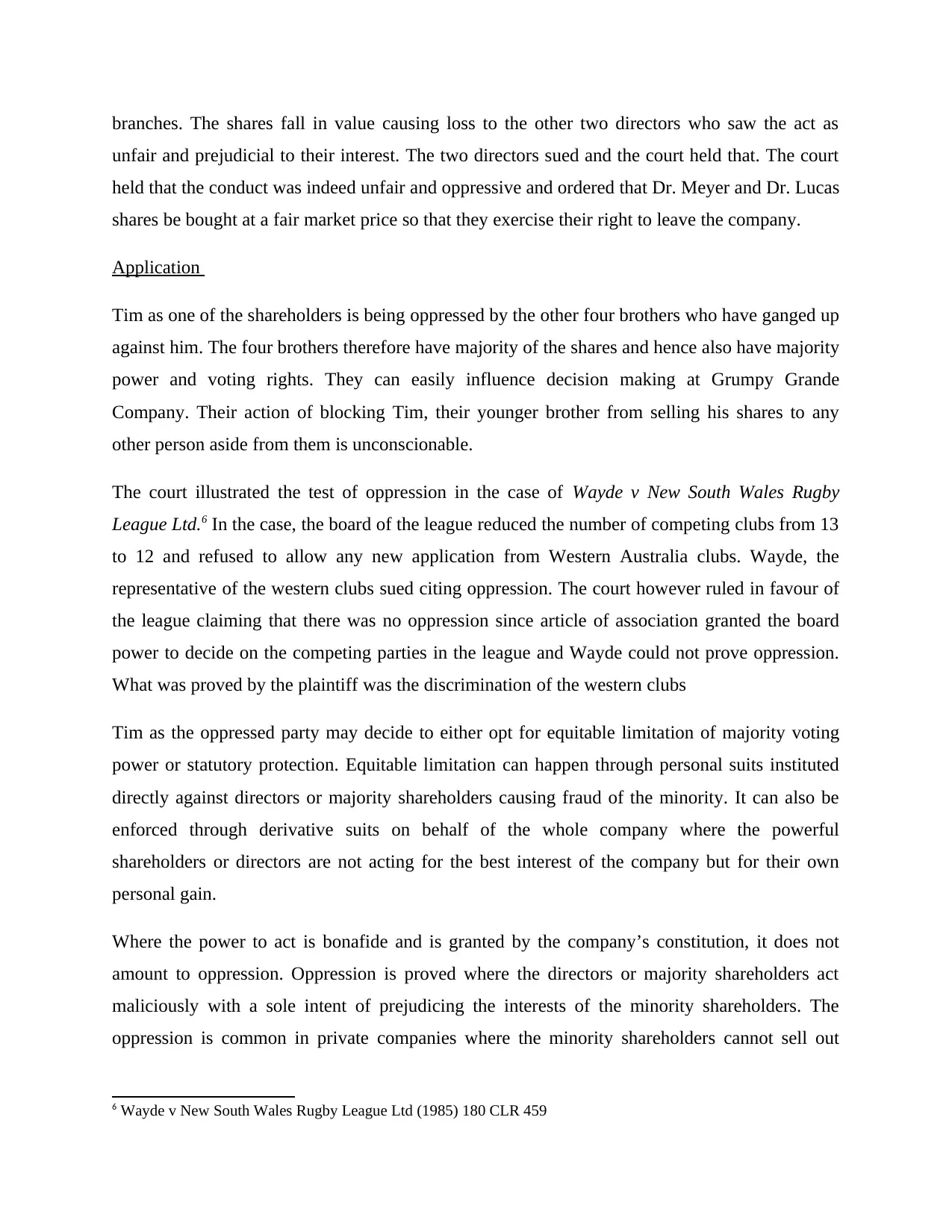
branches. The shares fall in value causing loss to the other two directors who saw the act as
unfair and prejudicial to their interest. The two directors sued and the court held that. The court
held that the conduct was indeed unfair and oppressive and ordered that Dr. Meyer and Dr. Lucas
shares be bought at a fair market price so that they exercise their right to leave the company.
Application
Tim as one of the shareholders is being oppressed by the other four brothers who have ganged up
against him. The four brothers therefore have majority of the shares and hence also have majority
power and voting rights. They can easily influence decision making at Grumpy Grande
Company. Their action of blocking Tim, their younger brother from selling his shares to any
other person aside from them is unconscionable.
The court illustrated the test of oppression in the case of Wayde v New South Wales Rugby
League Ltd.6 In the case, the board of the league reduced the number of competing clubs from 13
to 12 and refused to allow any new application from Western Australia clubs. Wayde, the
representative of the western clubs sued citing oppression. The court however ruled in favour of
the league claiming that there was no oppression since article of association granted the board
power to decide on the competing parties in the league and Wayde could not prove oppression.
What was proved by the plaintiff was the discrimination of the western clubs
Tim as the oppressed party may decide to either opt for equitable limitation of majority voting
power or statutory protection. Equitable limitation can happen through personal suits instituted
directly against directors or majority shareholders causing fraud of the minority. It can also be
enforced through derivative suits on behalf of the whole company where the powerful
shareholders or directors are not acting for the best interest of the company but for their own
personal gain.
Where the power to act is bonafide and is granted by the company’s constitution, it does not
amount to oppression. Oppression is proved where the directors or majority shareholders act
maliciously with a sole intent of prejudicing the interests of the minority shareholders. The
oppression is common in private companies where the minority shareholders cannot sell out
6 Wayde v New South Wales Rugby League Ltd (1985) 180 CLR 459
unfair and prejudicial to their interest. The two directors sued and the court held that. The court
held that the conduct was indeed unfair and oppressive and ordered that Dr. Meyer and Dr. Lucas
shares be bought at a fair market price so that they exercise their right to leave the company.
Application
Tim as one of the shareholders is being oppressed by the other four brothers who have ganged up
against him. The four brothers therefore have majority of the shares and hence also have majority
power and voting rights. They can easily influence decision making at Grumpy Grande
Company. Their action of blocking Tim, their younger brother from selling his shares to any
other person aside from them is unconscionable.
The court illustrated the test of oppression in the case of Wayde v New South Wales Rugby
League Ltd.6 In the case, the board of the league reduced the number of competing clubs from 13
to 12 and refused to allow any new application from Western Australia clubs. Wayde, the
representative of the western clubs sued citing oppression. The court however ruled in favour of
the league claiming that there was no oppression since article of association granted the board
power to decide on the competing parties in the league and Wayde could not prove oppression.
What was proved by the plaintiff was the discrimination of the western clubs
Tim as the oppressed party may decide to either opt for equitable limitation of majority voting
power or statutory protection. Equitable limitation can happen through personal suits instituted
directly against directors or majority shareholders causing fraud of the minority. It can also be
enforced through derivative suits on behalf of the whole company where the powerful
shareholders or directors are not acting for the best interest of the company but for their own
personal gain.
Where the power to act is bonafide and is granted by the company’s constitution, it does not
amount to oppression. Oppression is proved where the directors or majority shareholders act
maliciously with a sole intent of prejudicing the interests of the minority shareholders. The
oppression is common in private companies where the minority shareholders cannot sell out
6 Wayde v New South Wales Rugby League Ltd (1985) 180 CLR 459
⊘ This is a preview!⊘
Do you want full access?
Subscribe today to unlock all pages.

Trusted by 1+ million students worldwide
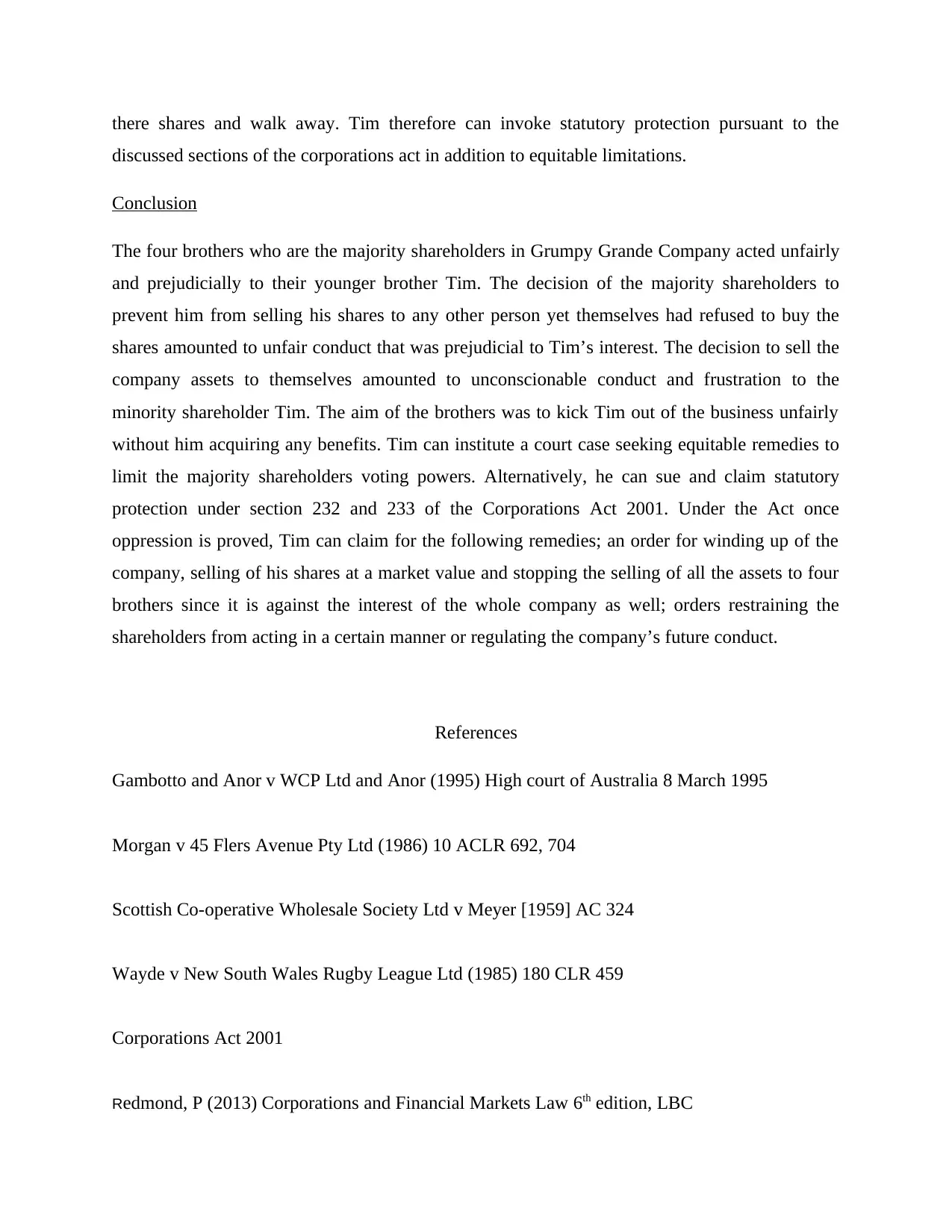
there shares and walk away. Tim therefore can invoke statutory protection pursuant to the
discussed sections of the corporations act in addition to equitable limitations.
Conclusion
The four brothers who are the majority shareholders in Grumpy Grande Company acted unfairly
and prejudicially to their younger brother Tim. The decision of the majority shareholders to
prevent him from selling his shares to any other person yet themselves had refused to buy the
shares amounted to unfair conduct that was prejudicial to Tim’s interest. The decision to sell the
company assets to themselves amounted to unconscionable conduct and frustration to the
minority shareholder Tim. The aim of the brothers was to kick Tim out of the business unfairly
without him acquiring any benefits. Tim can institute a court case seeking equitable remedies to
limit the majority shareholders voting powers. Alternatively, he can sue and claim statutory
protection under section 232 and 233 of the Corporations Act 2001. Under the Act once
oppression is proved, Tim can claim for the following remedies; an order for winding up of the
company, selling of his shares at a market value and stopping the selling of all the assets to four
brothers since it is against the interest of the whole company as well; orders restraining the
shareholders from acting in a certain manner or regulating the company’s future conduct.
References
Gambotto and Anor v WCP Ltd and Anor (1995) High court of Australia 8 March 1995
Morgan v 45 Flers Avenue Pty Ltd (1986) 10 ACLR 692, 704
Scottish Co-operative Wholesale Society Ltd v Meyer [1959] AC 324
Wayde v New South Wales Rugby League Ltd (1985) 180 CLR 459
Corporations Act 2001
Redmond, P (2013) Corporations and Financial Markets Law 6th edition, LBC
discussed sections of the corporations act in addition to equitable limitations.
Conclusion
The four brothers who are the majority shareholders in Grumpy Grande Company acted unfairly
and prejudicially to their younger brother Tim. The decision of the majority shareholders to
prevent him from selling his shares to any other person yet themselves had refused to buy the
shares amounted to unfair conduct that was prejudicial to Tim’s interest. The decision to sell the
company assets to themselves amounted to unconscionable conduct and frustration to the
minority shareholder Tim. The aim of the brothers was to kick Tim out of the business unfairly
without him acquiring any benefits. Tim can institute a court case seeking equitable remedies to
limit the majority shareholders voting powers. Alternatively, he can sue and claim statutory
protection under section 232 and 233 of the Corporations Act 2001. Under the Act once
oppression is proved, Tim can claim for the following remedies; an order for winding up of the
company, selling of his shares at a market value and stopping the selling of all the assets to four
brothers since it is against the interest of the whole company as well; orders restraining the
shareholders from acting in a certain manner or regulating the company’s future conduct.
References
Gambotto and Anor v WCP Ltd and Anor (1995) High court of Australia 8 March 1995
Morgan v 45 Flers Avenue Pty Ltd (1986) 10 ACLR 692, 704
Scottish Co-operative Wholesale Society Ltd v Meyer [1959] AC 324
Wayde v New South Wales Rugby League Ltd (1985) 180 CLR 459
Corporations Act 2001
Redmond, P (2013) Corporations and Financial Markets Law 6th edition, LBC
Paraphrase This Document
Need a fresh take? Get an instant paraphrase of this document with our AI Paraphraser
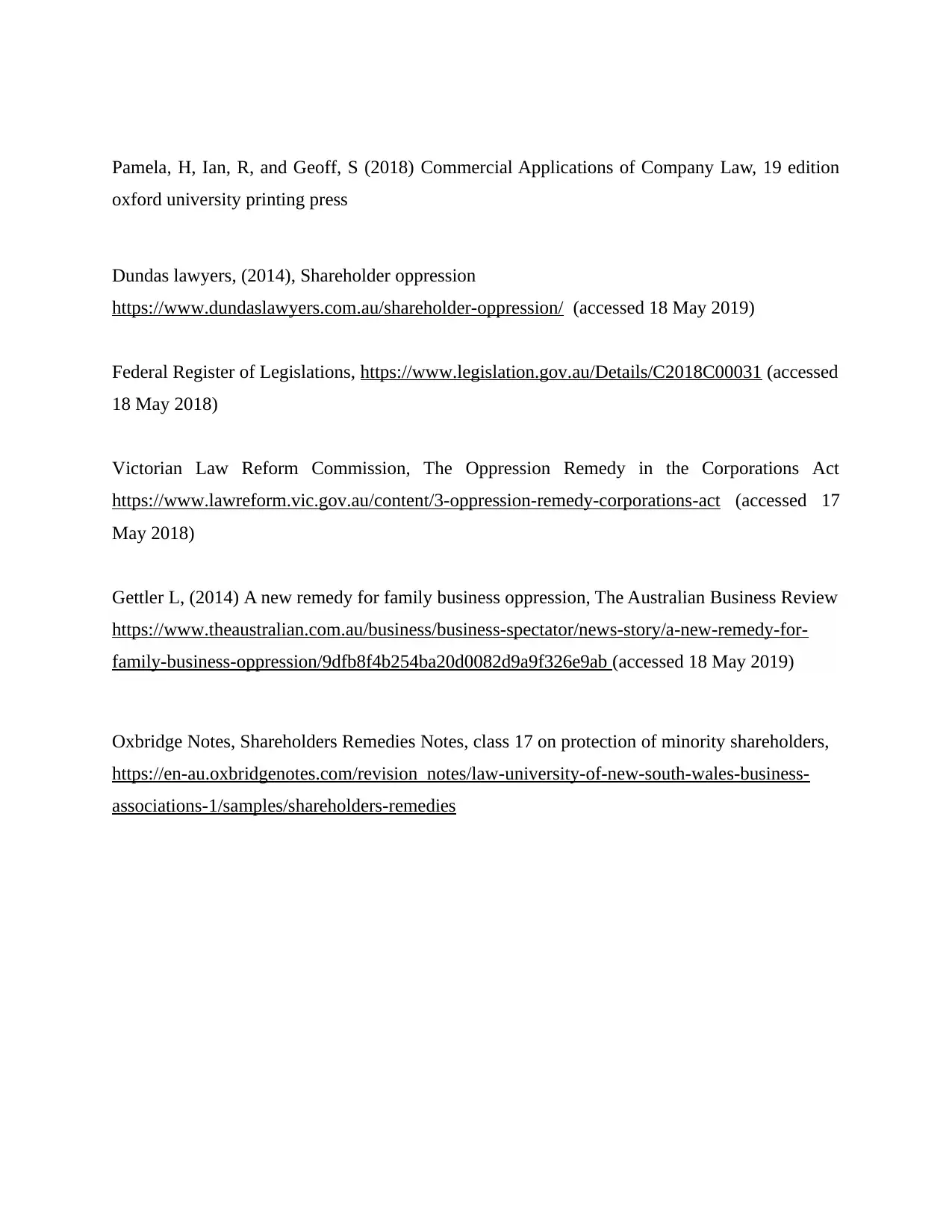
Pamela, H, Ian, R, and Geoff, S (2018) Commercial Applications of Company Law, 19 edition
oxford university printing press
Dundas lawyers, (2014), Shareholder oppression
https://www.dundaslawyers.com.au/shareholder-oppression/ (accessed 18 May 2019)
Federal Register of Legislations, https://www.legislation.gov.au/Details/C2018C00031 (accessed
18 May 2018)
Victorian Law Reform Commission, The Oppression Remedy in the Corporations Act
https://www.lawreform.vic.gov.au/content/3-oppression-remedy-corporations-act (accessed 17
May 2018)
Gettler L, (2014) A new remedy for family business oppression, The Australian Business Review
https://www.theaustralian.com.au/business/business-spectator/news-story/a-new-remedy-for-
family-business-oppression/9dfb8f4b254ba20d0082d9a9f326e9ab (accessed 18 May 2019)
Oxbridge Notes, Shareholders Remedies Notes, class 17 on protection of minority shareholders,
https://en-au.oxbridgenotes.com/revision_notes/law-university-of-new-south-wales-business-
associations-1/samples/shareholders-remedies
oxford university printing press
Dundas lawyers, (2014), Shareholder oppression
https://www.dundaslawyers.com.au/shareholder-oppression/ (accessed 18 May 2019)
Federal Register of Legislations, https://www.legislation.gov.au/Details/C2018C00031 (accessed
18 May 2018)
Victorian Law Reform Commission, The Oppression Remedy in the Corporations Act
https://www.lawreform.vic.gov.au/content/3-oppression-remedy-corporations-act (accessed 17
May 2018)
Gettler L, (2014) A new remedy for family business oppression, The Australian Business Review
https://www.theaustralian.com.au/business/business-spectator/news-story/a-new-remedy-for-
family-business-oppression/9dfb8f4b254ba20d0082d9a9f326e9ab (accessed 18 May 2019)
Oxbridge Notes, Shareholders Remedies Notes, class 17 on protection of minority shareholders,
https://en-au.oxbridgenotes.com/revision_notes/law-university-of-new-south-wales-business-
associations-1/samples/shareholders-remedies
1 out of 5
Related Documents
Your All-in-One AI-Powered Toolkit for Academic Success.
+13062052269
info@desklib.com
Available 24*7 on WhatsApp / Email
![[object Object]](/_next/static/media/star-bottom.7253800d.svg)
Unlock your academic potential
Copyright © 2020–2026 A2Z Services. All Rights Reserved. Developed and managed by ZUCOL.





